AntiNote: As horrific news continues to roll out of two high-profile sieges to dislodge the Islamic State—in Mosul and Raqqa—and support among Western leftists for Kurdish forces involved in these battles is for various reasons (and in some cases justifiably) on the wane, we recognize that reproducing testimony from a member of the Kurdistan Workers Party (PKK) is even more fraught with risk and potential for alienation than usual. However, the Antidote Writers Collective is above all interested in presenting the voices of revolutionary struggle on their own terms whenever possible, and trust our readership to be able to draw useful lessons from them regardless of conflicting allegiances or specific complaints. May we call your attention to our mission statement once more?
One thing in particular that we would like to point out about the testimony that follows is how similar it is to that of non-Kurdish Syrian revolutionaries in its critique of the Western left, despite these two (themselves of course multifarious) factions becoming increasingly suspicious of and hostile to one another in recent years. Perhaps that signifies for us Western leftists something we should be taking much more seriously than we are. And, to be one step bolder, perhaps it signifies for Kurdish and Arab revolutionaries (speaking broadly) that they have more in common than not. One can always hope.
“When I saw the mountains, I finally felt at home.”
Interview with Heval Ruken by Peter Schaber for Lower Class Magazine
26 March 2017 (original post in German)
Note from Lower Class Magazine: Seven years ago, Heval Ruken, a European leftist, decided to go to the mountains of Kurdistan, and ended up joining the Kurdistan Workers Party. We spoke with her about the differences between the revolutionary movements in Germany and Kurdistan, as well as about patriarchy, collectivity, and what annoys her most about German leftists.
Peter Schaber: When we look at your biography, it appears you have a familiarity with two different worlds of left activism: first, political activity in Europe over a significant length of time, and then seven years of work with the Kurdistan Workers Party. Could you lay out roughly what it was that prompted you to leave Europe, and what you found here [in Kurdistan] that you couldn’t find there?
Heval Ruken: I was politically active in Europe for a long time. I’d been familiar with the Kurdish movement for a long time too, but at first I made the conscious decision not to join, because I found it important at the time to build power independently in Europe. That was in the nineties.
Earlier there had been a pretty strong Kurdish movement, but it kept getting weaker and weaker after ’89. Nevertheless there was still hope of a second wind. I didn’t really buy into that. I looked into various other groups, to see what there was that could be improved—above all in the women’s movement and in the anti-racist movement. I tried for a long time to keep it up, and at some point I just couldn’t anymore.
Then I went to Kurdistan for a while, to Amed [Diyarbakır], and I got to know the movement better and also noticed that the movement in Kurdistan was totally different than in Europe. That’s when I made up my mind: if I claim to be a revolutionary, then I’ve also got to work like a revolutionary and live like a revolutionary. I observed of myself that I really wanted to be a revolutionary but couldn’t. “It won’t work, I can’t do it, that’s not what I am, I’m lying to myself,” I thought.
Then I arrived at the conclusion that there was no other way to be part of revolution than to go into the PKK. So I joined. Of course, when I first asked them, they said, “Sure, but you’re going to have a lot of trouble.” That was really good; my friends must have told me this at least three times, and then when there was trouble, I always had to laugh, because I couldn’t help remembering that they had warned me.
I had to live with this. I said I would accept it, and it’s also fine anyway. At the time I thought, I admit, that the difficulties would mostly be physical. I found out soon enough that there would be other kinds of difficulties. There were certain things I didn’t understand; I had dreams that didn’t fit the realities, and so on. But I’ve been here ever since.
PS: You mentioned that there was something about the feminist and anti-racist movements that didn’t work for you. What was it, exactly? What concrete issues were there that seemed—or indeed were—impossible to overcome?
HR: We wanted an alternative to the capitalist and patriarchal system—and it just never worked. In Europe in the seventies and eighties, there was still a women’s movement. But it was weakened in the nineties by various strategies of the state—on the one hand by divide-and-conquer politics; on the other, by being integrated into the system itself. Things that had been painstakingly built were lost. Even many of the values themselves that had been held and proclaimed before are gone today; values like solidarity among women aren’t as strong anymore as they were back then.
So we wanted to build something, but instead we lost even more. The assimilation of the movement into the state worked especially well; my own friends started to think on the same level as the state and ended up in the same structures. This made me feel alone again, isolated. The movement that we had became more and more isolated. You’re surely familiar with this yourself. Clearly there was always a “We’ll get there” mentality, until at some point I noticed, “No, we won’t.”
That became a problem for me, because I lost faith in the revolution in Europe. Still, I see in the PKK a movement and an ideology for all humanity, that is slowly being spread throughout the world. Here to start with, and then—sometime, perhaps—in Europe. In Europe there is a lot that we have lost, in the last five thousand years but especially in the last four hundred. Four hundred years ago there was the small family that existed in a form that we don’t know anymore in today’s Europe. Women had more active roles in the community, and there was still something called communal life. Capitalism emerged through violence. The murder of millions of women branded as witches, and the murder of millions of free-thinkers in the Inquisition was a necessary precursor to the establishment of capitalism.
Now capitalism is a system in which people live among one another as strangers, and are strangers even to themselves. In this sense, it is difficult to speak of “society” in Europe. Here, society is essential and tangible. It’s possible, with regard to society, to see a difference in the ideology of Serokati [Abdullah Öcalan] compared to most Marxist ideologies. Of course they have good principles, but don’t really get beyond certain things. In these ideologies the emphasis is on economy and economic oppression. But the problem is much deeper. The problem runs so deep that it can’t be solved on this level alone. The patriarchal system, over the last five thousand years, has either destroyed or disguised most of our humane values, and these have to be found again and reconstructed. A system of domination as important as patriarchy just cannot go unaddressed.
PS: Let’s stay for a second with the idea of collectivity, the kind of rehevalti, friendship, that prevails among Kurdish guerrillas. You mentioned that in Europe people are isolated from one another. We barely know each other; anything like a communal life has been completely destroyed. This description is definitely apt. What is it about the shared lives of guerrillas, the shared life in the mountains, that is different? How did it appear to you when you first arrived? How did you adjust to it? What things in particular gave you the feeling that this, here, is the way people should live?
HR: Where I come from, there are no mountains. I was totally unfamiliar with mountains, and I also didn’t speak any Kurdish. When I first arrived in the mountains here, though, I really had the feeling that I was home. Of course this is totally absurd. Everything was strange and unfamiliar, but I had the feeling already in the first moments that I had come home after many years away.
Of course I had to relearn everything, from the language to the ways of communal living. But there are also similarities. Earlier I had also tried to live within collective structures, and in left movements there are also communal ideals. What we understand as community and communal living in Europe is nonetheless totally different from how we understand those things here.
Here, you really feel others. You really feel how others are doing; when they aren’t doing well, you feel badly too. You are no longer separated from your comrades. In Europe you might live in communal structures, but you are still separated from others because you’re still separated from yourself. Here one can slowly begin to remove this separation. Communal life is not something that comes from outside, but you are one with your comrades like you are one with your own body. Just as you can’t cut off your arm, you can’t cut yourself off from your friends.
PS: What does that mean day to day?
HR: We do everything together and without being told. We work together, we live together, we keep on eye on what others need and try to accommodate the needs of others. Everyone knows everyone else really well, and we also know what others’ specific needs are, because we are all part of one another. In this regard, if there are problems, we can solve them well together.
PS: Especially in the military structures in the mountains, you’re with your friends 24 hours a day. Have you ever felt the need for a space to withdraw?
HR: No. Only if there were something that made me angry. But even then, I only need an hour to myself to think about it, and I usually see that it was actually my mistake. But that is a personal strategy not to hurt anyone else. In Europe I was much more aggressive than I am now, and couldn’t handle my anger as well as I can now. Society in Europe is pretty aggressive all around. It is mostly repressed, of course, but the aggressions are there. Because we live in a completely different society here, you can change yourself, and because you’re not living under oppressive circumstances all the time, you are much more relaxed.
A friend told me once, “You were like gunpowder at the beginning; now you are like gasoline. You still explode, but not as fast.”
PS: The relationships between men and women might be really different here. Is there a comparison to be made between your former comrades in Europe and your comrades here? What modes of behavior are different here? How is the slogan “Kill Masculinity” expressed in the day-to-day?
HR: The biggest difference is that here there is a very strong women’s movement, and it is discussed a great deal. Because of that there is more respect. Of course there are conflicts between men and women, but there is more respect, and women play a pretty important role at all levels of the revolution. In Europe, the customary idea is that there is no patriarchy, we are all the same. As a result, the patriarchy is that much stronger, and it is that much more difficult to struggle against it. In Europe there were always fights with male comrades, but there was no real support either from male or even from many female comrades. Because ultimately, since there’s no patriarchy, it must be an individual problem. Things were never seen at the level of patriarchy, and men don’t really do as much self-examination around it.
Therefore we’re much further along, in this question, than Europe. It would be important for men in Europe to really interrogate the patriarchy and its five-thousand-year history. You can’t be a socialist if you don’t examine this history and what it means to be a man or a woman in this society. That doesn’t work. You can’t be a leftist and want to build an “alternative” if you don’t look at the five-thousand-year patriarchy and try to understand what it does to you as a human.
This kind of interrogation goes on here 24 hours a day, and that’s why there are no problems here in that regard. And if there are problems, they are dealt with right away. There is also support from male comrades. If a male comrade doesn’t see or doesn’t acknowledge the strength of a female comrade, other male comrades will criticize him. We fought hard to establish these mechanisms.
This fight does not exist in Europe, though. Women can study and take leadership positions and so on; women play a large role in the left movements of Europe and are very active—still, this fight is never in the foreground, and the patriarchy has not been overcome. The point isn’t to what degree women play a role in movements, but rather whether you can really put something up against the patriarchy and whether it’s possible actually to build an alternative.
The system’s values, its ways of thinking and feeling, are deeply embedded. We have to change this system. In Europe, equality meant—this is how I experienced it in my own life—to give up my womanhood. It meant I can be “the same as a man,” but with a feminine identity, you won’t be taken seriously. It’s not like that here. You can have a feminine identity, and nonetheless have a frontline position—militarily as well as politically.
For us it’s about a new system of thinking, of feeling; there are also some altogether new values here. It’s not about “leveling the playing field,” there’s no such thing. In Europe the “playing field” has been leveled in an entirely different sense: it has been destroyed. The fight against Kurdish identity there is being fought in the name of expanding capitalism here.
PS: Let’s stick with that topic for just a second. Öcalan writes that this break with five thousand years of patriarchy is to be understood as a “total divorce.” That means that monogamous partner relationships and the small-family structure must also be called into question, since they reproduce mechanisms of dominance. In the guerrilla units, sexuality in this sense doesn’t exist—but what is the idea for the rest of society? What would be a future concept of shared life within a liberated society?
HR: There is the concept that relationships must be possible at a certain level of equality—not equality in the Western sense of “men and women are the same,” but rather that you actually take a look at how values like collectivity and communality can be strengthened within a community. At this level you must also have a view to all the various ways relationships between men and women can look. It could be that such a relationship takes the form of a family, and it could also be that in the future other forms will be found.
What happened in the Western world—that, leading from the critiques coming out of the feminist movement, the family was abandoned and men and women started tending to remain alone; divorce became more commonplace and difficulties for women with children only grew—is definitely not what we’ve got in mind. In Rojava we have also seen that many women have gotten divorced. That is not the solution. Then the women are stuck raising these kids alone. If it is somehow possible to find a solution within the family, where a shared life can be found with a level of respect and equality, that is better.
Another example from Rojava is that we’re working on building a whole women’s town, for women whose husbands have fallen or who for any other reason have children but no husband. The town will get everything that it requires to be self-sustaining: agriculture, work collectives, small manufacturing, schools, and so on. That is a clear alternative for women on another level entirely, to live together with other women and be able to look after their children.
PS: What kind of progress has been made in developing this kind of communal economy in Rojava?
HR: It’s moving forward slowly. We’re trying to construct a new system in every realm of society—media, economy, governance, ecology, social services and healthcare, diplomacy, education, politics, art, culture, and self-defense.
In the countries where we are working, there have been and are dictatorships. So we have to work under conditions that are predetermined, and first we have to create the awareness that a new system is necessary. I’ll give you an example: we want to start a cooperative in Rojava, and some Kurdish women were saying, “Oh, that’s great, Arab women will go to work for us.” So there are many difficulties to overcome.
But in Rojava at the moment, communes are being built in every region, and it is being attempted to integrate all the people who live there into the new system. Education is essential, because the prerequisite for this is that people are able to actually believe in this system.
PS: What can revolutionaries in Germany learn from this process?
HR: There are a few fundamental things. When you say you want to abolish capitalism and start something new, then it’s not enough to do demonstrations. That can be a part of it. But ideology is not just something that happens in your head. Ideology means to live differently, to establish a real alternative. For this, you have to understand how deeply the system of domination penetrates. And not to tell yourself constantly, “I am a socialist, therefore I’m better than everyone else.” That’s bullshit. I am exactly the same as anyone else. I was brought up and educated in the same system. “We’re the leftists, in other words we’re the good ones…” That’s bullshit.
To actually get out of this system, you have to understand that ideology is more than a conviction that you have. Ideology is a way of living. To change something in this regard is really hard in Europe—but certainly not impossible. What bothers me about parts of the German left is that they always read a ton and think they understand everything, but then they don’t do anything. Revolution is not just theory.
There has to be deep examination that is done together with others. If you don’t succeed in breaking isolation, there will never be a revolution. There have to be communal structures. It doesn’t work without them.
PS: When you say that people in Germany accumulate a lot of knowledge about what one must do, but then don’t do it, I would think that it has something to do with some kind of fear, fear of losing what little they still have. Earlier you were talking about the need for a new seriousness. I’d be interested to know how it was for you in this regard when you came here. I mean, here you could die at any time; the threat from the enemy is always present. Weren’t you scared?
HR: I think there are other fears that are more essential than the fear of death. The fear of being alone, standing alone. Or the fear that what you’re doing is futile. I think those kinds of fears are more real. And those fears are much more present in Europe. Because you’re alone. And maybe you work 24 hours a day as a revolutionary, but you barely achieve anything. You are always separated from others. You don’t have that sort of thing here. You are part of a communal life. Therefore you feel safe.
The fear that people will push you away because you did something wrong—that doesn’t exist here, either. Friends never give up on you; they pull you back over and over again, and ask you, “How come you did that wrong?” It’s not like that in Europe. You mess up, you’re gone for good. Here that fear is gone, and that was liberating for me. The fears that I had in Europe, I have been able to get rid of here.
The fear of death is negligible in comparison. The fear of not being able to live is much more existential. And you can’t really live in Europe. What we have in Europe is not living. In Europe we are raised in fear. That, of course, is also a mechanism of domination that serves to make us controllable.
Fine, here bombs could fall. But that knowledge doesn’t nag at you around the clock, and you also know how to protect yourself against it. It doesn’t constantly hold you back. It’s the same in battle situations. Sure, you get shot at; sometimes you don’t even know where the bullets are coming from. Nevertheless you don’t really feel fear. Physical pain is bearable. Fear of being isolated and alone, in contrast, is way worse.
PS: Earlier you indicated that for you here there is a vision of socialism that distinguishes itself from the socialism of the twentieth century. Could you lay out the most important differences?
HR: Socialism and democracy have to go together. The democracy we are talking about does not consist of being allowed to go vote every four years. It’s about people being able to organize their lives themselves, together.
If you really want to achieve something, you can’t do it with the wrong methods. To overcome domination, you can’t exert domination yourself. You can only attempt to build a socialist society through democracy. In the real-existing socialism of the twentieth century, there was always a group exerting domination. It just can’t be that a group holds itself over the rest of society and says, “We know better, and this is how we’re doing things now.”
If you look at Rojava, the population is building its own system. The population criticizes our cadres over and over, and we have to be able to handle it. It’s actually the population that is making revolution.
States are systems of domination. We believe that you can’t construct a society free of domination if you exert domination yourself. Therefore it is clear: no state; instead, a democracy from the bottom up.
This approach would also be important for Europe. You should be able to see that the problem does not consist merely of unequal distribution of wealth, but rather that the system of domination exists on many levels. You have to consider how to overcome this system of domination, and also how you can remove its aftereffects from the people who have been living under it.
PS: We’ve talked about a lot of things which aren’t discussed in Europe, at least not in the mass media: overcoming patriarchy, collective living, and so forth. To close it out, let’s talk again about the current situation. On Newroz we spoke with many friends who expect victory soon. The motto was mutlaka kazanacağiz, “We will certainly win.” How do you think the war will proceed in the coming year?
HR: I can’t see the future. It will definitely be a hard fight. At the same time, the building out of our structures in many regions will continue. I don’t think that the war will be over any time soon. It is too important to the various big powers. In Bakur [Turkish Kurdistan] and Rojava [Syrian Kurdistan] in particular, the conflict will be protracted.
What Newroz showed us, though, is that the population took to the streets in spite of the possibility that there could be attacks. Many demonstrated and celebrated anyway. That showed how great the power of the movement is among the population.
But the war isn’t going anywhere. Because it’s not a war between Turkey and the Kurds or between Syria and the Kurds. It is an international war. This is a decisive region for the various hegemonic powers. They are all at war here: Russia, America, Europe. For them, war is good—especially when it doesn’t take place in their own countries. Therefore I assume that they have an interest in making sure this chaos doesn’t end any time soon. These powers do everything they can to safeguard their influence in the Middle East. War makes them money. Further, this war is a reflection of the worldwide contradictions of capitalism.
But at the same time—you can see this very well in Rojava—we have been able to build our own system in spite of the war. And we expect this will be the case in Bakur as well.
PS: You said that the war in the region isn’t a local one but an international one. You come out of an anti-imperialist tradition yourself. What do you think is the task of anti-imperialist forces in Europe?
HR: To organize themselves. If there is no serious self-organization, then there is no basis upon which to declare solidarity with anyone else. Therefore the first task is to build your base. What capitalism does, though, is make this kind of organizing impossible on many levels. The enemy has many strategies at its disposal: it sows mistrust and conflict. In many groups on the German left, you’re only busy with internal conflicts and barely manage to get over them. This is a drain on energy and time. Internal conflicts, mistrust, fear—these are the strongest weapons of capitalism. To understand this is important: that it’s not just the criminal justice system, tear gas, and police truncheons. Particularly in the big cities, it is other weapons that are being used.
If you in Europe aren’t organized yourselves, then declaring solidarity with the struggle here is nonsensical. “I think Kurdistan is cool.” Okay, great. But that doesn’t mean anything really. If you don’t have your own base of power, you can’t even assert anything against your own state, let alone anywhere else. If you don’t talk to your own neighbors, how is it that you want to build this base? If you don’t know your own neighbors, their pains and wishes, then you’re not organizing.
Translated by Antidote
Featured image: Willi Effenberger / LCM

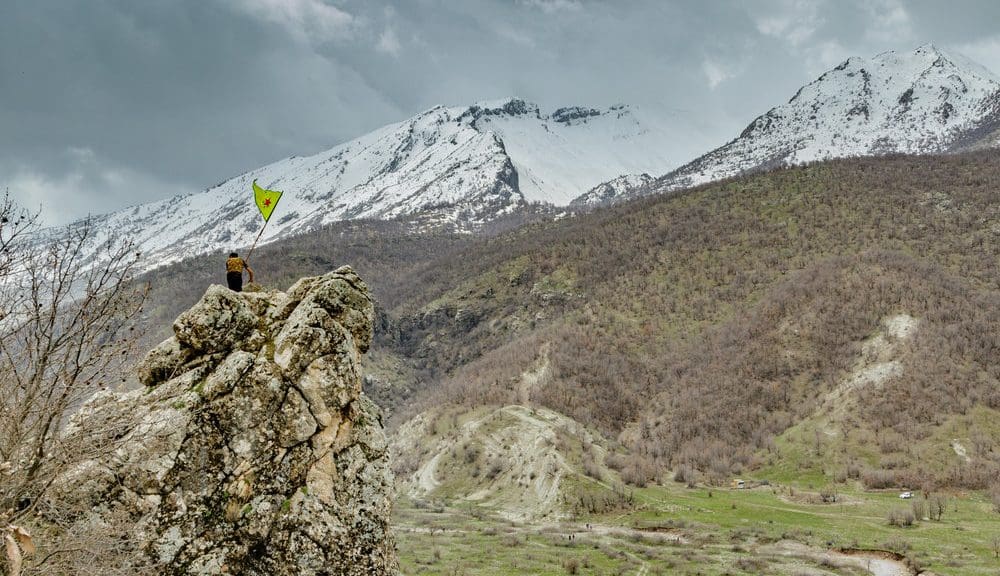
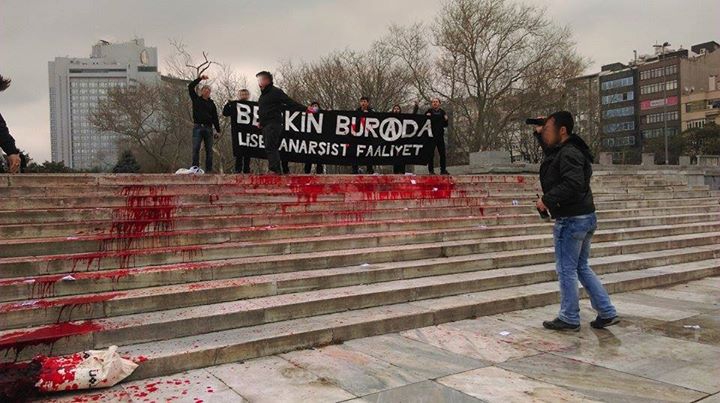
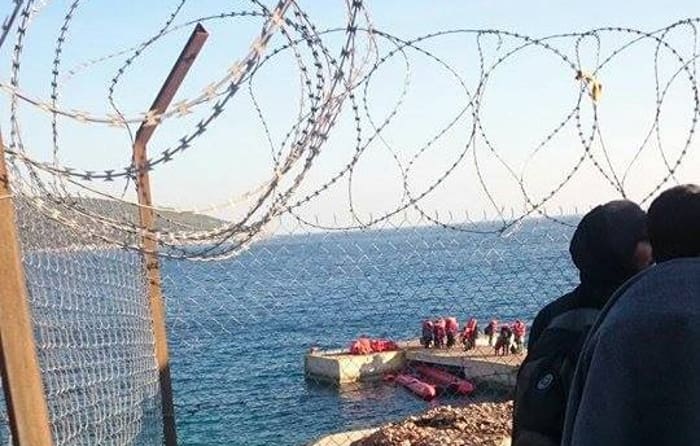
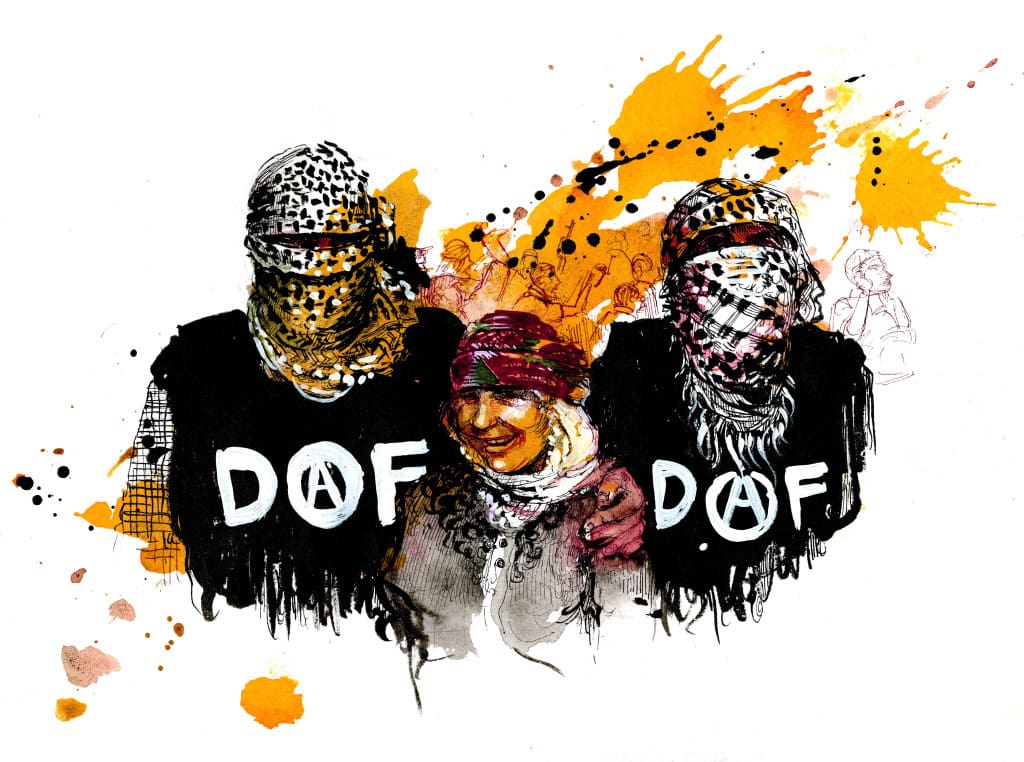
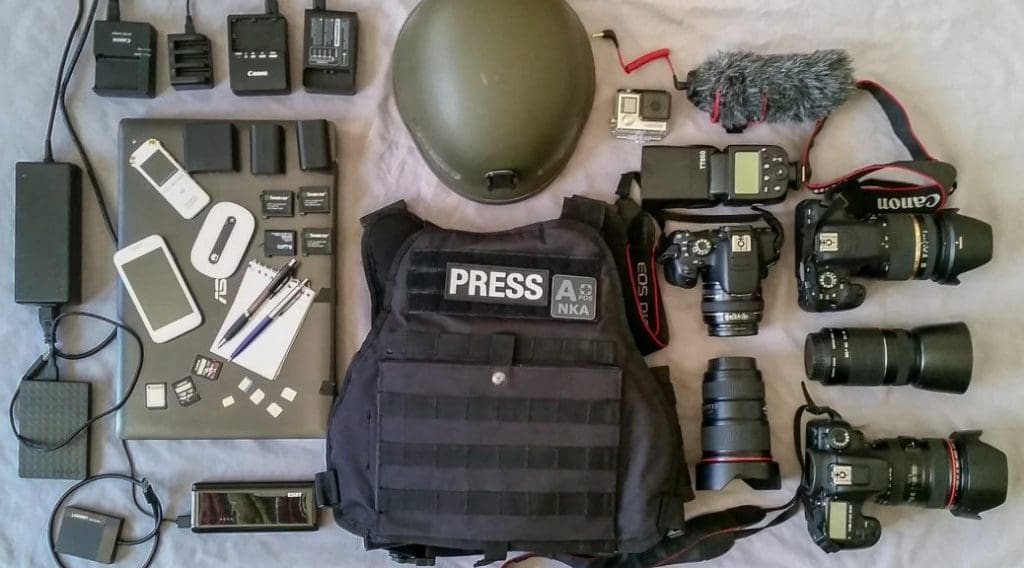
Pingback: “Fear of death is nothing; not being able to live is worse.” – an interview with Heval Ruken of the PKK – Kurdistan Solidarity Network
Pingback: Life Is Beautiful | aNtiDoTe Zine